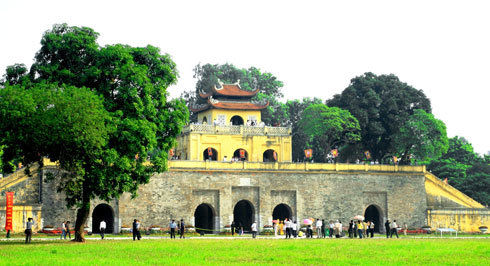Scientists have for the first time identified the most comprehensive cultural stratum of the UNESCO-recognized Imperial Citadel of Thang Long, the Vietnam News Agency (VNA) said Tuesday on its website.
The findings were provided at a meeting which was organized the same day to report the results of the latest excavation on the citadel’s Central Sector.
Located in Ba Dinh District, Hanoi, the citadel is Vietnam’s former capital and one of the country's most significant historical relics.
The stratum is believed by experts to span from the 8th and 9th centuries to the 19th and 20th centuries.
According to the organizers of the excavations at the site, the Thang Long Heritage Preservation Center and the Institute of Archeology, the latest excavating work shed light for the first time on the architectural vestiges which lasted from the Ly Dynasty (1009–1225) to the modern era.
The vestiges include foundations, a yard built of brick, and a large waterway. During the latest excavation, archeologists have also preliminarily identified part of the Kinh Thien Principal Palace in the Central Sector.
The excavation also unearthed a large number of porcelain and glazed terracotta artifacts which date back to the 1428-1527 period of the Posterior Le Dynasty (1427-1789), the Vietnam News Agency cited Prof. Phan Huy Le – chair of the Vietnam Association of Historical Science – as saying.
The excavation also helped solve several puzzles regarding the heritage and its comprehensive structure and layout, Le added.
The professor, however, stressed that the new findings are only initial steps into working out the UNESCO World Heritage Site’s mysteries.
Experts from the Thang Long Heritage Preservation Center and the Institute of Archeology also suggested the excavation pits be expanded to the east of those dug in 2012 and 2013 for further exploration.
Scientists and experts from the two institutions estimated in a seminar held in December last year that it would take at least a century to explore the Imperial Citadel of Thang Long in depth and 50-60 years just to delve into its core sector alone.
They stressed that myriad mysteries about the complex, such as the layouts of the Ly and Tran dynasties’ architecture within the citadel, are awaiting revelation.
The first excavation into the complex, which kicked off in 2008, revealed a considerably larger area, which according to experts’ estimation would measure several hectares, compared to the originally unearthed areas of a few thousand square meters.
The findings in the excavation areas within the citadel in 2012 and 2013 have cemented a Japanese professor’s conviction that the complex boasts Asia’s best preserved underground architecture, last year’s seminar heard.
Inscribed in the UNESCO’s World Heritage List in June 2010, the Imperial Citadel of Thang Long, located in the heart of Hanoi, was built in the 11th century by the Ly Dynasty on the remains of a Chinese fortress dating from the 7th century, UNESCO states on its website.
One of the country’s most momentous relics, the citadel was subsequently expanded by the Tran, Le, and Nguyen Dynasties.
The complex withstood a succession of regime changes to remain the seat of regional political power for almost 13 centuries.
The first remains were unearthed on the site of the former Ba Dinh Hall, or the old National Assembly Building, which was demolished in 2008 to make room for a new parliament building.
Like us on Facebook or follow us on Twitter to get the latest news about Vietnam!



















































